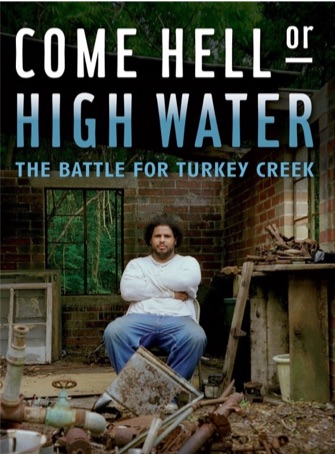Curator
 — Amity Doolittle, Senior Lecturer and Research Scientist, Yale School of Forestry and Environmental Studies
— Amity Doolittle, Senior Lecturer and Research Scientist, Yale School of Forestry and Environmental Studies
Shelter in Place
An intimate portrait of a community battling against environmental pollution from Texas oil refineries and petrochemical plants.

Curator
This film was selected by Amity Doolittle, senior lecturer and research scientist at the Yale School of Forestry and Environmental Studies.
Writers
The film guide was written by Caroline Scanlan, with research support from Liz Felker and Elham Shabahat, graduate students at the Yale School of Forestry and Environmental Studies.
Why this film was chosen
This documentary presents intimate stories of specific individuals living in the community adjacent to refineries in Corpus Christi and Port Arthur, Texas, who are exposed to toxic emissions from the petrochemical industry. The film maintains a balanced perspective by interviewing residents as well as company representatives and government officials.
However, by the end of the film, it becomes clear that companies are exploiting a legal loophole that allows them to release large quantities of unplanned emissions known as “upsets” without penalty while simultaneously denying that the emissions affect human health.
Meanwhile, local residents mount legal challenges to the emissions but are frustrated in their efforts to demonstrate a causal relationship between polluting industries and health problems, especially where there are multiple toxins involved.
Teacher's guide
Please see the teacher's guide for maps, background information and suggested subjects, questions and activities.
Synopsis
Texas has become richer than all but ten of the world’s sovereign nations, but at what human cost? It is the vast, sprawling complexes of oil refineries and petrochemical plants that help make the Texan economy one of the biggest in the world. These industries are legally permitted to release millions of tons of toxic pollutants into the air each year, plus thousands of tons more in ‘accidental’ or ‘unscheduled’ releases. When these incidents happen, local residents are told to stay in their homes and tape up their windows and doors. This procedure is called “shelter in place.” Communities living on the border of these Texas industries are usually poor, African American and powerless to protest. This film is an intimate portrait of a community battling against environmental pollution and corporate power.
The vast, sprawling complexes of oil refineries and petro-chemical plants help make the Texan economy one of the biggest in the world. But does the wealth come at too a high a price to the local community? Beautifully filmed, and burningly relevant. A film that speaks to the roots of the environmental justice movement in North America.
The environmental justice focus of the film
This film shows how communities affected by toxic chemicals face enormous difficulties when they try to make their voices heard. To begin with, the overall health of the community members may be seriously compromised not only by the direct exposure to “upsets” and “chemical cocktails” but also by the lack of medical care and the chronic stress that comes from knowing that they and their children may suffer long‑term damage from exposure to the pollution. This stress, in turn, makes residents more vulnerable.
When the community challenged the polluters and pointed to actual harm to their health from the unregulated emissions, the company demanded that they demonstrate a direct connection between their exposure to specific chemicals and their compromised health. While the cumulative effect of the pollution may be scientifically evident, it remains difficult to prove a causal relationship because individual responses will vary and the actual emissions are not documented.
Finally, the residents may find themselves stymied by the complex, frustrating, and sometimes intractable process of gaining a hearing, demonstrating damages, developing regulations, and implementing controls. Meanwhile, the pollution and stress continue at a high cost to the lives and health of these low-income residents. This unfair stalemate highlights the injustice that flows from the imbalance of power between corporate interests and local communities.
"Beautifully shot, Shelter in Place is an emotionally engaging portrait of a people without a voice." - THE INTERNATIONAL FILM GUIDE
Awards
Official Selection, Sheffield Film Festival, 2009 Winner of the Short Pitch Prize, Britdoc, 2008
Citation
Main credits
Nelson, Zed (film director)
Nelson, Zed (director of photography)
Patterson, Hannah (film producer)
Other credits
Film editor, John Mister.
Distributor credits
Hannah Patterson
Zed Nelson
Filmed and Directed by ZED NELSON
Producer -HANNAH PATTERSON
Film Editor- JOHN MISTER
Executive Producers- SARAH TIERNEY, STEVE BOULTON, KATIE BRADFORD
Assistant Producer- CARINA WILSON
Production Assistants- MARTIN McGALE, CAROL COOKE
Additional Camera- ADAM JEPPESEN JAY OLIVIER
Sound -CLARE EDMANS
Online Editor- SUE GIOVANNI
Dubbing Mixer- JEZ FODEN
Titles- MARC KNAPTON
Docuseek subjects
Politics and Political Science
North American Studies
Environmental Health
Illness, Disease and Disorders
Americas, The
African-American Studies
Toxic Waste
Corporate Social Responsibility
Citizenship, Social Movements and Activism
Human Rights
Race and Racism
Global / International Studies
Film and Video Studies
Pollution
Toxic Chemicals
History
Ethics
United States
Fossil Fuels
Environmental Geography
Distributor subjects
African American Studies
Biology
Capitalism
Corporate Social Responsibility
Economics
Environmental Justice
Environmental Law
Ethics
History
Human Rights
Law Enforcement
North American Studies
Occupational Health and Safety
Pollution
Public Health
Race and Racism
Science and Technology
Toxic Chemicals
Toxic waste
United States
Keywords
Welcome to Docuseek2!
Docuseek2 is a streaming platform of the best documentary and social issue films available for the higher education community.
Anyone may search for titles and find detailed information about the titles. To preview films or license them for streaming, you must register and login.
Currently, we support online registration for anyone affiliated with a higher education institution. Please inquire if you are with a K-12 district or school or with a public library.
Click the Close button to get started!


